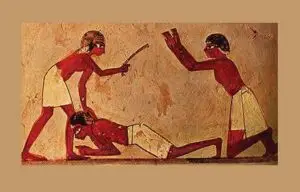The TaNaKh is not necessarily religious literature. Yet, even when it speaks of the mundane it invariably hints at the sublime. That’s what makes it such powerful reading. Case in point is Chapter 23 of the Book of Genesis.
In the land of Canaan, Abraham—the father of the Israelite and “a multitude of nations”—buys ”a field to bury his wife Sarah, who has just died. (Eventually, in addition to Sarah, also Abraham himself and the other patriarchs and matriarchs Isaac and Rebekah, and Jacob and Leah will be also buried there.)
The lengthy description of the highly choreographed negotiations between Abraham and the citizens of Hebron, where the burial place is to be located, is puzzling. There must be a reason for such an elaborate account, particularly when considering the paucity of information surrounding Moses’ grave (“no one knows his burial place to this day.” Debarim (Deuteronomy), Chapter 34, verse 6).
Abraham has nowhere been told he has to bury his wife in a specific location, nor about mourning rituals. This being the TaNaKh’s first treatment of burial, Abraham acts on his own without divine instruction. In so doing, he makes a profoundly human rather than ritualistic statement.
“A funeral, like ceremonies of birth and marriage,” notes Somni Sengupta, who covers the United Nations for the New York Times, “signifies that a person belongs somewhere, which is a kind of definition of being human.”
David Rosenberg, the former editor-in-chief of the Jewish Publication Society, reminds us that no afterlife is invoked and there are no declarations of triumphant religion. God has withdrawn, and in his place Abraham is left to negotiate over the survival of his family’s history.
Abraham’s objective, as repeated several times through the chapter, is burying “his dead.” To be able to do this requires having a piece of property of his own.
The irony must be noted that the man to whom the whole land has been promised for him and his seed must receive permission from the local population and pay out a large sum of money in order to gain a mere burial plot.
Jerold S. Auerbach, professor emeritus of history at Wellesley College, comments that once title to the burial field passed to Abraham, Jewish history in the land of Israel had begun.
The significance of the burial land’s purchase, hence its detailed account, lies in the fact that once the patriarchs possessed a small strip of the land, their burial place, they were no longer sojourners in a land not of their own. More than that, it became a testimony of Abraham’s belief in the promise of a future inheritance.
Insofar as Abraham’s life signifies the beginning of something other than Jewish history, it is the beginning of a culture of responsibility, that is the ability to respond to life’s demands.


